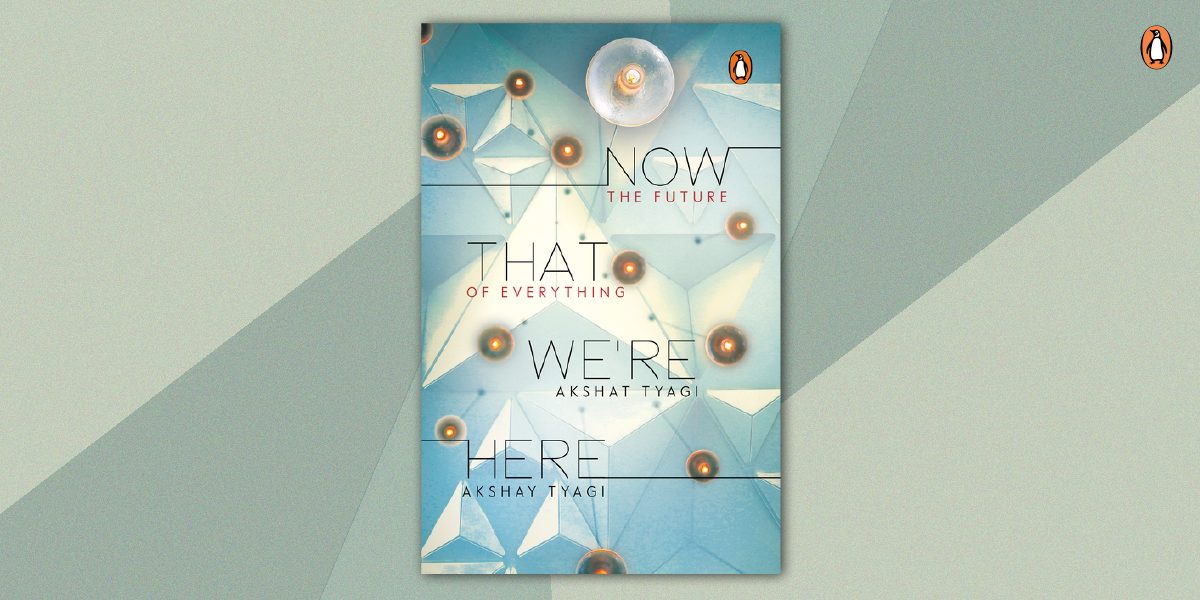Author’s Note: We didn’t write a generalist guide for the future imagining a once in a lifetime pandemic. This is not the moment of celebration we would have chosen for the book. There’s so much else that needs your love and attention right now. Now that we’re here, we hope the book can offer some comfort and optimism about humanity making it through difficult times, and things getting better.
Now That We’re Here by Akshat Tyagi and Akshay Tyagi is a generalist guide about navigating the future in times of a pandemic. A playful mix of social science and technology, the essays on Data, Design, AI, Behavioural Economics and other important themes provide a peep into what’s coming. The following excerpt is from the chapter Viral Economics, written as the pandemic was unfolding.
—
Even though the collapse of economic prosperity is terrifying, the mourning of its fall should not turn into an endorsement for its previous design. Our economic growth has been highly inequitable, especially so over the last few decades. When your income drops from INR 70,000 a month to INR 40,000, it pinches hard. But even before the crisis, the average monthly income in India was below INR 12,000. We are still an extremely poor country, and we keep forgetting that fact until the next flood, drought or recession arrives.
Our public education hasn’t prepared us to understand the urgency of a pandemic. What you read in this book on data, complexity, economy and technology should be considered basic education. We were so busy bickering over Tipu Sultan’s mention in our history textbooks that we forgot to learn about the history of the Spanish flu and why there wasn’t anything particularly Spanish about the 1918 influenza pandemic.
It is important to maintain civil order by converting a difficult fight against the virus into a temporary celebration of essential workers. But in a different world, our government would be able to explain to us a virus’s non-linear growth graph, and we would pay our workers far better than we do. Making people bang pots and pans is okay only if we understand what we’re dealing with and how long it’s going to last. Otherwise, we are all at the mercy of our beloved leader and his wisdom.
With his utterances about injecting disinfectants and recommending unproven medical cures, Donald Trump may have made daily briefings look like a bad exercise in democracy. But they at least showed us how competent he was as a leader in handling emergencies, helping Americans divert him to other interesting things in the next election. To not show oneself at all during a moment of national crisis or conflict is a signature feature of tyrants. Stalin and Hitler were absent from public appearances for much of the war.
A country of 1.3 billion people with very high linguistic diversity, no universal access to devices for listening to a live broadcast, an unstable electricity supply and a two-hour difference in mean solar times between its easternmost and westernmost points shouldn’t be reliant on a charismatic head of state’s address to the nation. No leader can appeal to the sensibilities and convenience of such a diverse population in an hour’s time.

Our Internet penetration is at the highest-ever point in our history, our data rates are the cheapest in the world and journalism is bleeding to death because of its open access—so why then were we still busy rioting as late as February 2020! Arundhati Roy called the madness of communal sickness our version of the coronavirus before we officially got sick with Covid-19.
A pandemic lays bare our structural injustices. Just like with any other disease, the poor are at a disadvantage here too. Pre-existing medical conditions and weak immune systems both increase vulnerability and are, not so surprisingly, correlated in part to one’s economic standing. Little access to nutrition, poor hygiene, few resources shared by more members in the family and safety hazards at repugnant jobs are all risks that Dalits and Muslims have faced for all of our developmental history.
When Ebola spread in a slum in Liberia, the area was sealed off with the help of armed forces. At the rioting of residents, indiscriminate fire helped restore the desired calm. You never heard about this because it didn’t happen in a gated community of rich citizens in a politically significant country.
…
There is no bright side to a pandemic. In fact, ignorant optimism hurts more when the threat is a respiratory virus. Leaders who tell false stories to trick people into staying calm destroy public trust in leadership and create greater chaos. A pandemic is also the time when more and more of us grow comfortable with the idea of compromising our liberty to let the government act. Naomi Klein, a strong advocate against neoliberalism’s worst, has been warning for a decade that emergencies should not be allowed to worsen inequalities and decrease political transparency.
We cannot buy our way out of this virus, but as we wait for medical solutions to arrive we should remain vigilant about the ad hoc measures offered by our governments.
A pandemic is the worst time to stop holding your government responsible.
**
The book explores how our friendships, jobs, health and democracies are changing, and why we must prepare for this new unpredictable world. There aren’t any easy answers, but Now That We’re Here let’s be vigilant and kind.







